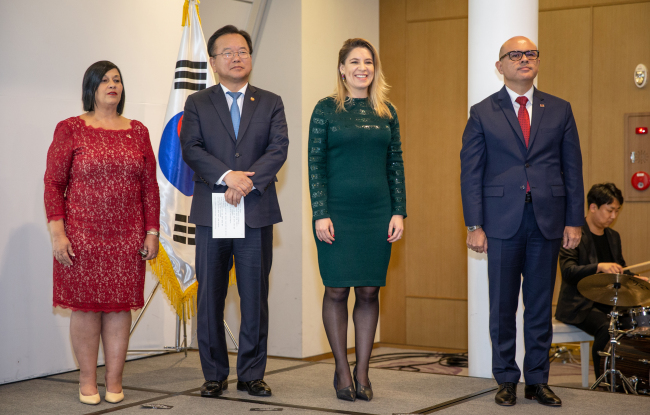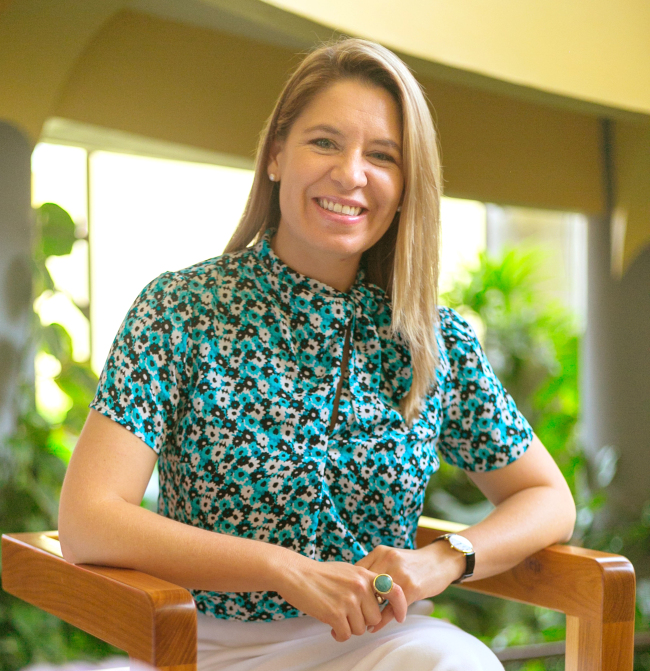[Herald Interview] Costa Rica, South Korea kindred spirits in sustainability: first lady
“We consider Costa Rica an element of stability in a complex region, a country built on the values of cooperation, multilateralism and sustainable development.”
By Joel LeePublished : Oct. 15, 2018 - 17:03
Costa Rica, a country prioritizing sustainability in Central America, looks to South Korea for greater cooperation based on shared values of peace and dialogue, multilateralism, sustainable development and human emancipation, its first lady Claudia Dobles Camargo told The Korea Herald in an exclusive interview.
Dobles Camargo came to Korea last week to strengthen bilateral ties and celebrate the 197th anniversary of Costa Rican independence, which fell on Sept. 15. Her agenda focused on vitalizing cooperation in technology and innovation, green growth and carbon-neutral public transportation, particularly promoting the prospective construction of an electric train around the San Jose Greater Metropolitan Area.
“We consider Costa Rica an element of stability in a complex region, a country built on the values of cooperation, multilateralism and sustainable development,” Dobles Camargo said last week. “We believe these values are in tandem with South Korea’s, and specifically the vision of President Moon Jae-in’s administration in trying to bring peace and stability to East Asia through diplomacy and dialogue.”
Dobles Camargo came to Korea last week to strengthen bilateral ties and celebrate the 197th anniversary of Costa Rican independence, which fell on Sept. 15. Her agenda focused on vitalizing cooperation in technology and innovation, green growth and carbon-neutral public transportation, particularly promoting the prospective construction of an electric train around the San Jose Greater Metropolitan Area.
“We consider Costa Rica an element of stability in a complex region, a country built on the values of cooperation, multilateralism and sustainable development,” Dobles Camargo said last week. “We believe these values are in tandem with South Korea’s, and specifically the vision of President Moon Jae-in’s administration in trying to bring peace and stability to East Asia through diplomacy and dialogue.”

Born in 1980, the first lady is the wife of President Carlos Alvarado Quesada, who assumed office in May this year and will govern through 2022. She is a trained architect with 14 years of experience in large-scale international projects worldwide.
As first lady, Dobles Camargo said she strives to address housing, mobility and urban planning issues for her country, also leveraging international cooperation.
“Cities must be planned for a sustainable future. Due to global warming and technological disruptions, it is our duty to change our vision of city-making to a more dynamic and participatory process,” she stressed.
Noting she will speak at the Private Investment for Climate Conference organized by the Green Climate Fund in Incheon from Oct. 10-11, she pointed out that Costa Rica will launch a decarbonization plan toward the end of this year and diversify the nation’s sustainability criteria, which includes an assessment of the impact on infrastructure, technology, and water and waste management.
“We want Korean companies to participate in the bidding process,” she said, referring to the 72-kilometer electric train construction project that will link the San Jose Greater Metropolitan Area’s four provinces with the capital. “We are seeking financing and capacity-building for large-scale mobility projects that are underway in Costa Rica, including the electric train system, which will be our first zero-emissions public transportation. There is also ample room for cooperation with Korea in incorporating information technology solutions and smart technology.”
Currently, a feasibility study is slated for completion next year, she noted, adding that international bidding is expected to take place by 2021 and construction will start in 2022.
During her visit, Dobles Camargo met Korean first lady Kim Jung-sook, Minister of Land, Infrastructure and Transport Kim Hyun-mi and officials from the National Institute for International Studies, an agency that provides scholarships to foreign students.
“Sustainability is the only way we can protect our next generations. The international community should work as a team and learn from each other,” she said, mentioning that nearly all of Costa Rica’s electricity is derived from renewables -- mostly hydropower, followed by solar, wind, geothermal and biomass.
“We understand that sustainable development is a very articulated process that needs to be done in an integrated way. That’s why we are not taking actions in silos, but have a decarbonization plan that cuts across all sectors of our economy, from infrastructure, transportation and housing to agriculture, ecotourism and education.”
Costa Rica is well known worldwide for its progressive environmental policies. It is the only country to meet all five United Nations Development Program criteria for measuring environmental sustainability, and was twice ranked the best-performing country on the New Economics Foundation’s Happy Planet Index, which measures environmental sustainability.
The nation of less than 5 million people plans to become carbon-neutral by 2021 with a clear road map and implementation plan that will wean its economy off fossil fuels.

Dobles Camargo positioned Costa Rica as a highly stable country with a strong commitment to democracy.
“We strongly believe in democracy, respectful dialogue and consensus,” she said. “Private investors look for political stability and economic certainty, and we offer that with our national culture that prioritizes democracy, peace and rule of law.”
She also underscored that Costa Rica invests strongly in education, and has one of the best educational systems in the region. “As a Costa Rican citizen, you can have high-quality public education for your entire life. We say in Costa Rica that we only have two armies: of students and diplomats. That’s how we have built Costa Rica as a socially stable country.”
This year also marks the 70th anniversary of the abolition of Costa Rica’s army. Partly as a result of the historic decision, the nation has consistently scored well on the Human Development Index, placing 69th in the world in 2015 -- the highest rank for any Latin American nation. It has also been cited by the UNDP as having attained much higher levels of human development than other countries with similar income levels, with a better-than-average record on human development and inequality in the region.
“We welcome investments from companies that share our values,” she explained, adding large potential exists for Korean and foreign firms to invest in Costa Rica and use it as a base for tapping into larger markets throughout Central and Latin America.
Electric vehicles, environmentally friendly logistics and public transportation, smart city development, education, ecotourism, agriculture and renewable energy are some of the sectors awaiting foreign investment, she said.
“We have a deep admiration for Korea’s technological development that has positioned your country as a global leader,” said Costa Rican Vice Foreign Minister Lorena Aguilar Revelo at a reception marking the country’s 197th independence anniversary on Oct. 8 in Seoul.
“Your millenary culture, creativity, capacity to innovate and strong determination to improve the quality of life through education, science, technology and trade are lessons that we want to transfer to Costa Rica. Precisely, we hope to work with partners like Korea to promote one of our foreign policy pillars -- harnessing knowledge and learning and innovation.”
Costa Rican Ambassador Rodolfo Solano Quiros said San Jose and Seoul had experienced 56 years of “fruitful encounters and knowledge transfers” through official diplomacy, eventually forming a Comprehensive Strategic Cooperation Partnership.
“Costa Rica and Korea are working on strategic cooperation projects and initiatives in science and technology, innovation, infrastructure, education, technical and vocational training and citizen security, to name a few,” he said. “In particular, we work together to promote our creative economies and startups, create research and development clusters and implement health-related initiatives, including organ transplantation and commercial medicinal patenting.”
By Joel Lee (joel@heraldcorp.com)








![[Kim Seong-kon] Democracy and the future of South Korea](http://res.heraldm.com/phpwas/restmb_idxmake.php?idx=644&simg=/content/image/2024/04/16/20240416050802_0.jpg&u=)







![[KH Explains] Hyundai's full hybrid edge to pay off amid slow transition to pure EVs](http://res.heraldm.com/phpwas/restmb_idxmake.php?idx=652&simg=/content/image/2024/04/18/20240418050645_0.jpg&u=20240418181020)

![[Today’s K-pop] Zico drops snippet of collaboration with Jennie](http://res.heraldm.com/phpwas/restmb_idxmake.php?idx=642&simg=/content/image/2024/04/18/20240418050702_0.jpg&u=)